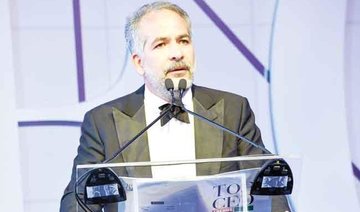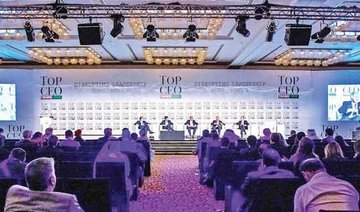What happens when you turn a top-notch banker into a shopkeeper? If the plans for Arabian Centres under its CEO Khalid Al-Jasser are anything to go by, you will end up with some very big shops.
After 27 years in which he reached the top of the Saudi banking industry, Al-Jasser was appointed last year to lead the company that has become the biggest malls operator in Saudi Arabia, and which has plans to get even bigger.
He is rather more than a shopkeeper, of course, as the head of a multibillion-dollar company that designs, builds and operates megamalls.
“You cannot teach an old dog new tricks, they say, but I don’t think that’s true. I was a banker for many years until I was hijacked by Arabian Centres. It was about time. I’d reached the top in the banking system, and had done corporate, treasury and investment banking. I’m on a steep learning curve in the malls business, but at the end of the day, it’s all about the same thing — money,” he said.
We are speaking in the ornate lobby of the Jumeirah Al-Qasr hotel in Dubai, where Al-Jasser had been topping up his expertise in his new profession at the World Retail Congress. The annual event is about shops and shopping, of course, but it has also gained a reputation as a forum where new consumer and social trends are analyzed.
That is of crucial importance to Saudi Arabia, and Al-Jasser’s business. If the Saudi strategy to transform economy and society is to succeed, it needs men like him at the sharp end of implementation.
Gulf’s biggest market
Arabian Centres — part of the Fawaz Al-Hokair conglomerate — is at the exact spot where government policy meets Saudi consumers, the people who form the biggest single economic market in the Arabian Gulf and whose buy-in to the transformation process is critical.
Over the past 15 years, Arabian Centres had led the consumer revolution in the Kingdom, and now has 19 malls, accounting for about 10 percent of the gross leasable space in the country, and 10 more planned for the next two years.
It is more than just a business. It has been at the forefront of social change in Saudi Arabia, and will continue to be.
The explosive growth of malls in Dubai is a guide as to how the business can grow quickly, but there are crucial differences in the Saudi and UAE markets, as Al-Jasser explained.
“Malls here (in Dubai) are full of tourists. In Saudi (Arabia), the overwhelming majority of people who go to malls are nationals. They want the full customer experience, which is why our malls are built to such a high standard. They are big spacious buildings, with 45 meters between columns; the ceilings are 16 meters high. Those are the kind of specifications you usually see in palaces, not in malls,” he said proudly.
He also reckons the emphasis on customer experience makes his business more resistant to the pressures of e-commerce sweeping the Gulf. The Al-Hokair holding company is investing significantly in e-commerce in some of its other retail offerings, notably in ladies’ fashion, but it is not the top priority for the malls business.
This is probably a good time to go for an IPO. We are seriously looking at it. I cannot comment on whether or not we’ve hired advisers, but we are seriously looking at the possibility of an IPO.— Khalid Al-Jasser
“We’re keeping an eye on (e-commerce) but Saudi people want to shop in the mall, not from their computer,” he believes.
“But the single biggest difference is that we are not dependent on tourist trade, except perhaps Makkah at certain times. So there is not the seasonality of Dubai. There is a much bigger indigenous population, in a much bigger country than the UAE. We get more than 130 million visits to our malls in a year. That’s more tourists that go to France and Spain combined,” he added.
Saudi Arabia may not depend on tourist seasonality, but it is acutely vulnerable to the fortunes of the Saudi economy. Since the oil price began falling in 2014, consumer spending in the Kingdom has been inevitably hit. The fiscal austerity of 2016, in particular, affected household consumption in the Kingdom, and while there are some indicators that the worst may be over, there is little sign of a strong pickup, according to the London-based consultancy Capital Economics.
“We expect Saudi consumer spending to settle at rates of around 2-3 percent over the coming years, well below those of 6-7 percent recorded in the past decade,” said analyst Jason Tuvey.
Al-Jasser acknowledges the effects of lower spending but said it has not been reflected in footfall at his malls, which has held up well.
“I think that people always panic when oil is falling. But it’s cyclical. In the good old days, when it was as high as $120 people were making profits of 30 to 40 percent, but they panic when they’re just making between 10 and 15 percent. But that’s still a good profit. It’s not as though they’re losing money,” he said.
IPO on the horizon?
So the Arabian Centres expansion goes on. Three new malls in Riyadh, Jeddah and Dammam are under construction, at an estimated cost of several billion riyals, so the commitment to growth seems unstoppable.
How does he plan to fund that growth? Arabian Centres is, of course, a cash generator and has funded its growth out of normal reserves and bank borrowing — but buying land, development and construction are all costly processes.
The holding company considered an initial public offering (IPO) in 2014 after the successful IPO of Emaar Malls in Dubai showed there was big investor appetite for the shares. The economic effects of the oil-price decline caused those plans to be shelved, but it is some mark of the confidence with which he sees the future that a share flotation is under active consideration once more.
“This is probably a good time to go for an IPO. We are seriously looking at it. I cannot comment on whether or not we’ve hired advisers, but we are seriously looking at the possibility of an IPO,” said the former banker.
“I cannot tell you about the financial size. We are a private company and not obliged to disclose figures, but I can tell you we are a big company.”
If the IPO goes ahead — some analysts suggest later this year — Arabian Centres will be part of the wave of privatization and stock market flotations envisaged under the National Transformation Plan (NTP) 2020 and the Vision 2030 strategy document.
“I’m very supportive of the plan, and don’t really know anybody who is not supportive. It has widespread support and everybody is behind it. It will put Saudi Arabia ahead of its time. The efforts by Deputy Crown Prince Mohammed bin Salman are key. He is not only leading Saudi Arabia into a new era, but he is also teaching us to be more efficient, not to waste our resources,” he said.
Arabian Centres is also a leading advocate of the other social changes that accompany the new strategy — providing more job opportunities for Saudi nationals and increasing female participation in the workforce.
It provides around 59,000 direct jobs in the Saudi economy, many of them for Saudi nationals. “I think Saudis are prepared to work in retail provided they are trained and get good opportunities.
“We will also want to increase the number of women. We already employ a good number in the fashion business, and that will increase under the economic transformation plans,” he said.
There are around 1,200 women currently employed in the Al-Hokair group fashion business, and he expects that to rise.
Like other parts of the Gulf, malls are not just shopping centers, but entertainment, social and family leisure locations. That will include, at some stage, plans for cinema entertainment in Arabian Centres malls, which the Saudi authorities are considering licensing.
The Al-Hokair group’s hospitality division is also building hotels in or near the Arabian Centres malls. “We are part of a group that is very keen to give its customers care and attention for the whole family,” Al-Jasser said.
We are reaching the end of our time at Al-Qasr, but he has one other thing to add: “Now, put your pen away and I will tell you something,” he said, indicating he wants to go “off record.” I listen intently as he compares and contrasts Saudi energy trends with another, much bigger country that has to remain nameless. He’s obviously thinking well beyond the shopping counter.
Khalid Al-Jasser, chief executive officer, Arabian Centres
• Khalid Al-Jasser joined Arabian Centres as CEO in May 2016.
• Under his leadership, the retail real estate company aims to double its retail offering by 2018.
• Arabian Centres currently it operates 19 malls spread across 10 cities in the Kingdom. It has 10 malls in the pipeline.
• Al-Jasser, previously CEO of Bank Albilad, was credited with growing the bank’s operations and its emergence as a leading Shariah-based financial solutions provider.
• He previously served as the executive vice president of Riyad Bank where he spent 12 years in various leadership roles.
• He also served on the Boards of Bank Albilad, Saudi Travelers Cheque Company, and Qassim Cement Company.
• Al-Jasser is fluent in Arabic, English and Spanish.






















